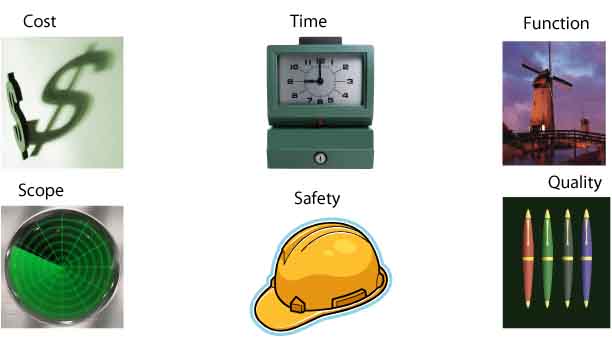Are you in Control?
Are you in control of your projects? For that matter, what does it mean to be in “control”? Construction projects are measured on six areas of success, and these success factors can be used to measure success on other projects as well. These six areas are:
 Cost is measured in terms of proximity to initial budget and accuracy. Costs need to be well documented and due diligence has to be done. Ironically often times the second part is overlooked. Auditing has found issues including: mathematical footing, charges outside agreed terms & rates, charges that could not be justified as being incurred, illogical expenses, and duplicate payments.
Cost is measured in terms of proximity to initial budget and accuracy. Costs need to be well documented and due diligence has to be done. Ironically often times the second part is overlooked. Auditing has found issues including: mathematical footing, charges outside agreed terms & rates, charges that could not be justified as being incurred, illogical expenses, and duplicate payments.
Time is also critical. Consider, for example, if you are opening a hotel – delays in the opening mean lost revenue. Above and beyond this it creates problems with reputation, can harm relationship with other vendors, may create regulatory problems due to missed inspections or permitting issues – thus causing further delay. Be careful for change orders that ask for time inspections.
If a change order is a delay due to weather it should be supported by proof that weather conditions exist. Not all projects are as time sensitive as others so consideration should be made accordingly.
Quality is another factor and it goes without saying that if you pay for a particular service you expect it to meet requirements for use or intended purpose. A project in which software is being installed would not be a success if the project causes system failures or compromises the integrity of data.
Safety goes beyond just beyond what may be considered obvious. Safety can be compromised if sensitive information is leaked or disseminated outside the boundaries of the project. Protection should include requirements to make all vendors sign confidentiality statements.
Scope would be comprised if what you paid for what not what you intended to get.
Function is measured if the project is completed in such a way that it can be used as it was intended without having to incur any additional costs or commitments. For example if you bought a car from a car dealership and when you picked up the car they tell you that the engine was not included in what you bought but it could be added for an additional charge. One has a reasonable expectation that an engine is included.
One last criteria to determine if you are in control falls outside the critical success factors. It comes down to how control is defined in the contracts. Since many contractors – for construction and non-construction work are written by contractors, an owner may not realize they are relinquishing control until it is too late.
Denise Cicchella
